Senate Celebrates Asian Heritage Month

In honour of Asian Heritage Month 2016, SenCAPlus asked seven Senators how their Asian heritage impacts their work.
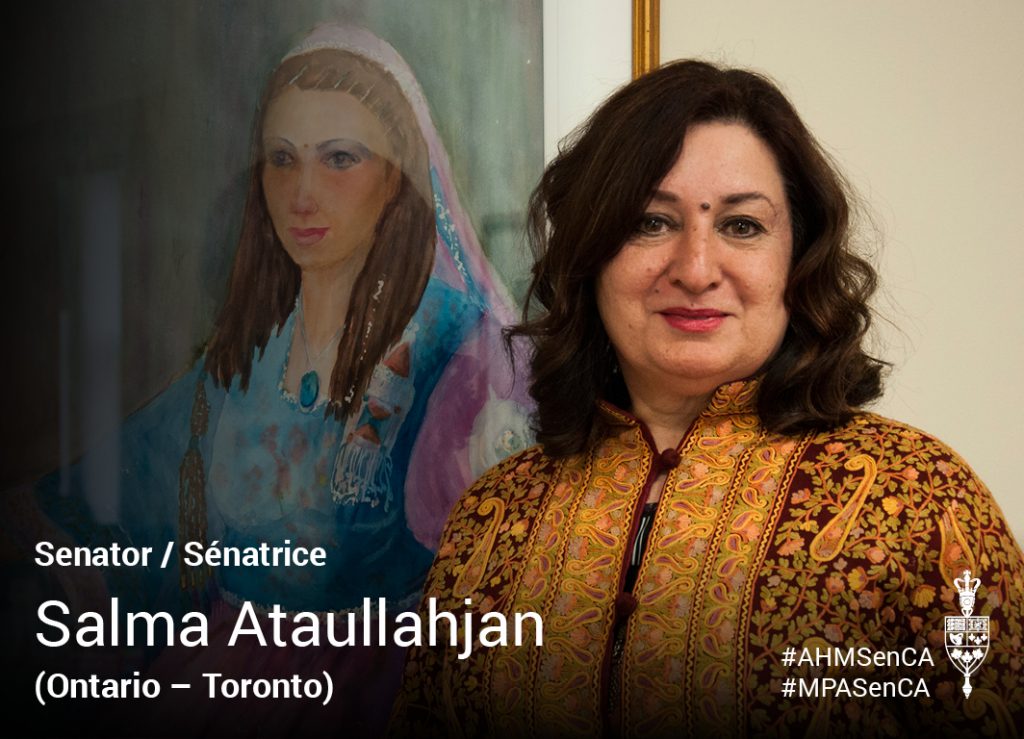
How does your Asian heritage shape your work/role as a Senator?
I have always been a tremendously proud member of the Pakistani-Canadian community. When I was appointed in 2010, I knew one of my unwritten mandates as a Senator would be to be a voice in the Senate for my community.
I am the first Pakistani-Canadian Senator, and I take this to heart in many aspects of my work here in Parliament, whether it’s in the statements I give or my work in committees. Being a voice for the community is always present in my thoughts.
How do you keep in touch with your Asian heritage?
My heritage is part of my everyday life. If I had to choose just one aspect, it would be strong ties to family — not only to my own family with my husband and two daughters here in Canada, but also to my father, siblings and their families back home in Pakistan, with whom I am in constant touch. Celebrating Eid with prayers and family and friends is one of the many examples of time spent together that is special to me.
What person or community group do you think deserves special recognition during Asian Heritage Month for their contributions to Canada?
It would be too hard to name just one. There are so many Pakistani-Canadians contributing to all aspects of our society, whether it’s as stay-at-home mothers caring for their children, or as doctors, business leaders, politicians and artists. It is truly hard to pinpoint one — I am proud of every Pakistani-Canadian who is contributing to our wonderful country in a positive way.
Read more about Senator Ataullahjan
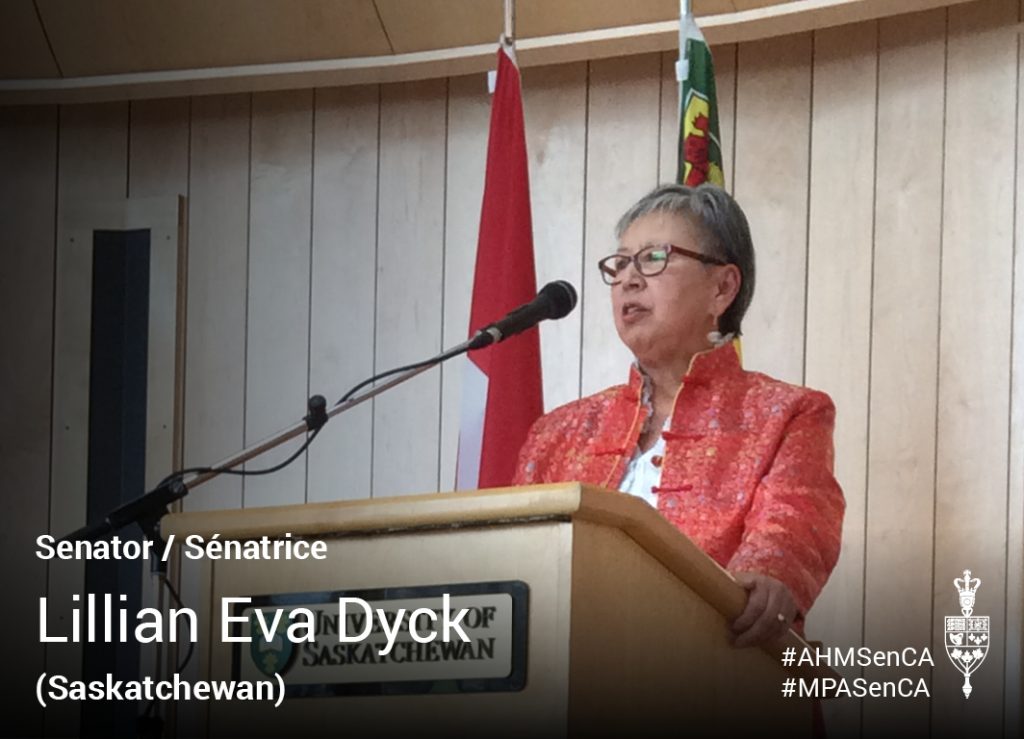
How does your Asian heritage shape your work/role as a Senator?
My father, who came to Canada from Canton, China in 1912 as a 14-year-old, faced many challenges, including legislation that was discriminatory. He had to pay a head tax; he couldn’t bring his first family to Canada (he returned to China for a couple of years later on and got married in the 1920s); he was unable to hire white women in his café due to a provincial law; and he was unable to vote until 1945. I’ve spoken a lot about these discriminatory laws in the Senate and in many speeches to the public.
How do you keep in touch with your Asian heritage?
Chinese New Year is an important holiday for my family. I remember with pleasure the feasts we had when I was a kid, and we'd get together to celebrate with the Chinese families from neighboring towns.
In 2009, I was invited by the Guangdong Chinese Overseas Association to visit my ancestral home in China. This is a photo of me in traditional dress, taken at the Summer Palace in Beijing.
What person or community group do you think deserves special recognition during Asian Heritage Month for their contributions to Canada?
Eleanor Shia from the Saskatoon Multilingual Schools and the Heritage Chinese Language School. She is also the representative of Saskatoon Chinese community groups.
Read more about Senator Lillian Eva Dyck
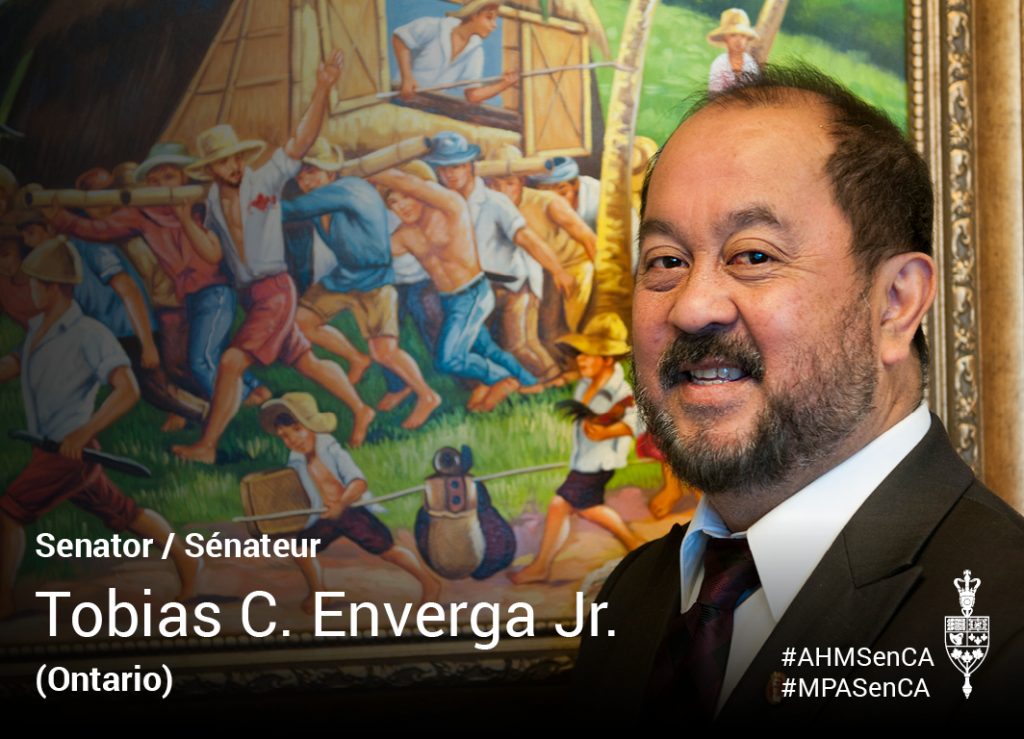 How does your Asian heritage shape your work/role as a Senator?
How does your Asian heritage shape your work/role as a Senator?
I always believe that multiculturalism is one of the greatest strengths of Canada.
Being a Canadian of Filipino and Asian origin, I have that unique opportunity to represent a broader group of people, not just those in the Province of Ontario, but also members of the Filipino and Asian-Canadian communities all over Canada.
The Senate has come to bolster representation of groups often underrepresented in Parliament, such as Aboriginal peoples, visible minorities and women. We, as visible minorities and Asian senators, have a responsibility and the ability to share and contribute our unique values, skills, and culture to complement and enhance various Senate roles and duties for the country as whole.
How do you keep in touch with your Asian heritage?
I used to be one of the directors of the Canadian Multicultural Council – Asians in Ontario and a co-chair of the Asian Heritage Month celebrations in the Greater Toronto Area. I always endeavour to maintain my roots and friendship with many unique communities to celebrate their culture.
As a Canadian of Filipino descent, I always join the celebration of Philippine Independence Day around June 12. This day is one of the times when I wear the national attire of the Philippines, Barong Tagalog, an item of clothing for men that is made from the delicate leaves of pineapple and adorned with intricate embroidery.
What person or community group do you think deserves special recognition during Asian Heritage Month for their contributions to Canada?
There are a lot of organizations that I believe deserve special recognition during Asian Heritage Month. There are organizations that cater to new immigrants and to members of the community who require support, and there are those that endeavour to celebrate their particular cultures. All of them contribute to the betterment of Canadian society, making it extremely difficult to pick only one.
Read more about Senator Tobias C. Enverga Jr
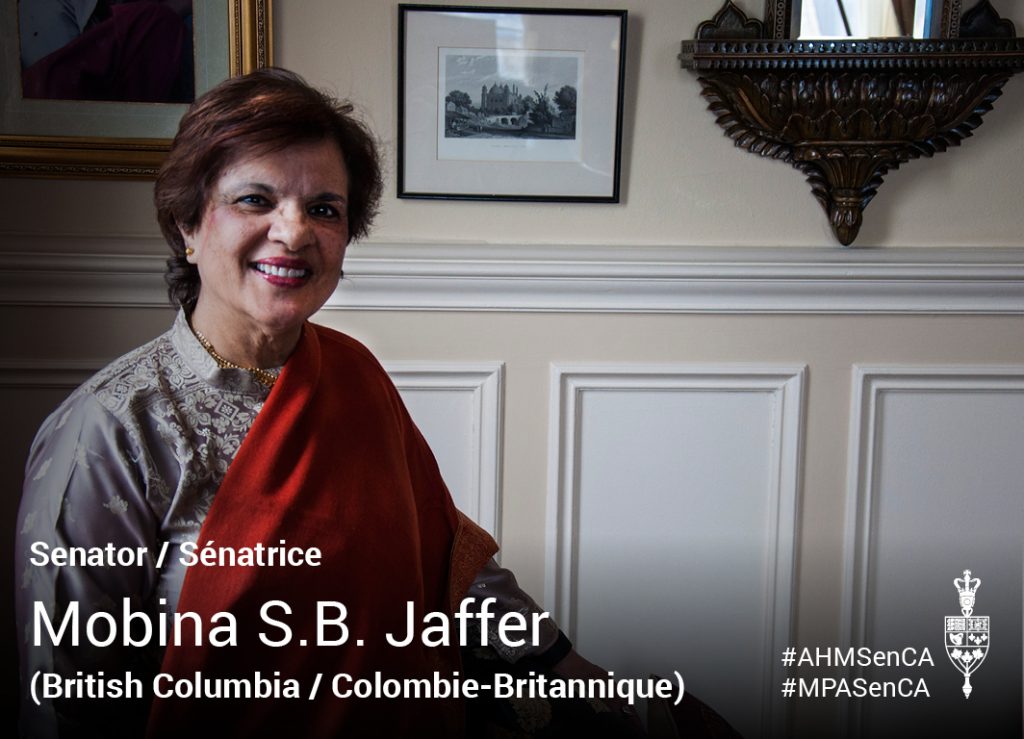 How does your Asian heritage shape your work/role as a Senator?
How does your Asian heritage shape your work/role as a Senator?
Being Indian is an important part of my identity and is reflected in everything I do, both professionally and personally. As a Senator for the province of British Columbia, I am proud to work on issues that are closely linked to my Asian heritage through such means as being a member of the Canada-Pakistan Parliamentary Friendship Group, leading an inquiry in the Senate on the Komagata Maru and participating in cultural events like Asian Heritage Month.
How do you keep in touch with your Asian heritage?
Being Indian and African is such a big part of who I am as person, from what I eat, the language I speak with my family, the music I listen to and the clothes I wear. However, one thing that I particularly enjoy is dressing up in a sari. My mother always told me that a sari was beautiful because it was nine yards of fabric that would fit any woman in the world. That is something that has always stuck with me.
What person or community group do you think deserves special recognition during Asian Heritage Month for their contributions to Canada?
Former Senator the Honourable Dr. Vivienne Poy.
Read more about Senator Mobina S. Jaffer
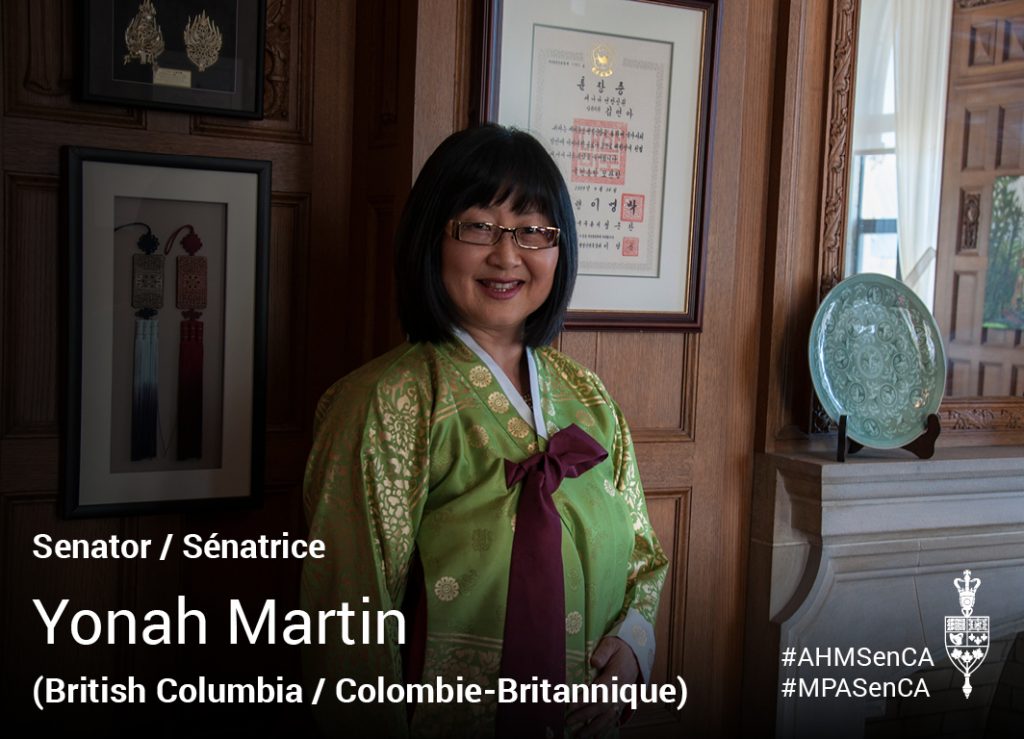 How does your Asian heritage shape your work/role as a Senator?
How does your Asian heritage shape your work/role as a Senator?
The lens through which I view the world and the work I do as a Senator is directly shaped by my Korean heritage. It is who I am.
This means that I am aware of the history of my ancestors, who were kings, freedom fighters, scholars and more. It is a heritage that is steeped in thousands of years of history that includes examples of incredible resilience, valour, pain and sacrifice, including that of my immigrant parents.
This rich and complex heritage is a source of inspiration and strength for me, and it motivates me to serve Canadians to the best of my ability.
How do you keep in touch with your Asian heritage?
My parents promised my paternal grandfather in Korea that they would raise me and my siblings with as much of the Korean culture and traditions as possible.
Only Korean language was spoken in our home (but interestingly we all went on to major in English in our post-secondary degrees). We used chopsticks and ate Korean food at home and observed all the major cultural traditions and holidays.
It was like living in two worlds within and outside of our home, but growing up in East Vancouver — where diversity was always the norm — I never felt out of place among my ethnic Italian, Portuguese, Hungarian, Chinese or German friends who also had immigrant parents.
What people or community groups deserve special recognition during Asian Heritage Month for their contributions to Canada?
I think the pioneers like Douglas Jung (the first Canadian MP of Asian descent) and the Honourable Dr. Vivienne Poy (the first Canadian Senator of Asian descent) as well as the Very Reverend Sang-Chul Lee (a former moderator of the United Church of Canada and a Korean-Canadian pioneer) deserve special recognition for paving the way for us.
Read more about Senator Yonah Martin
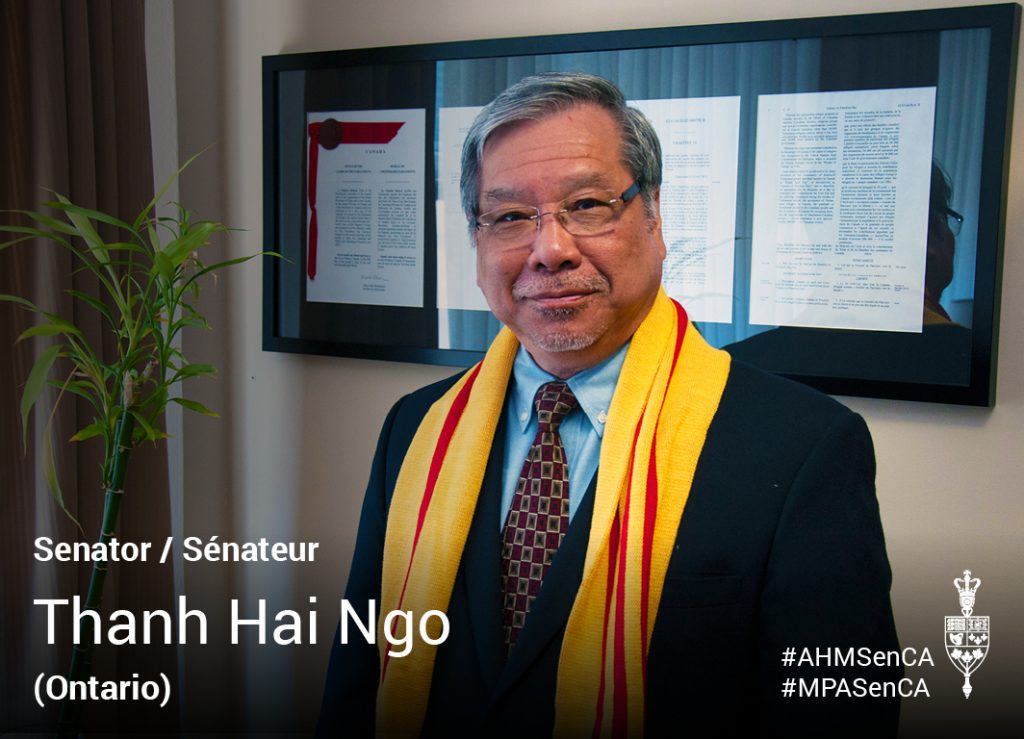 How does your Asian heritage shape your work/role as a Senator?
How does your Asian heritage shape your work/role as a Senator?
As the very first Vietnamese-Canadian Senator, I believe that my heritage is important in shaping my work. It is an example of how the Vietnamese who left their country fleeing oppression have been able to find a home here in Canada, adding to the diverse culture in which we share democratic values and become great contributors to Canadian society.
How do you keep in touch with your Asian heritage?
Through my work, I am able to be involved with the Vietnamese-Canadian communities across the country, and we frequently celebrate and commemorate many cultural traditions. Lunar New Year, also known as Tet in Vietnamese, is the largest celebration of the year, where the community gets together to share food and perform dances and songs.
The Vietnamese diaspora in North America identifies itself with the flag of South Vietnam, also known as the Vietnamese heritage flag, or freedom flag. It was the official flag before the fall of Saigon in April 1975, as opposed to the current Vietnamese government flag.
Last year, I introduced a bill in the Senate that was passed on April 23, 2015: the Journey to Freedom Day Act, which establishes April 30 as a day to remember April 30, 1975, as the Fall of Saigon and the beginning of the Boat People exodus. This is also an important date as it marked the beginning of the modern Vietnamese-Canadian community.
What person or community group do you think deserves special recognition during Asian Heritage Month for their contributions to Canada?
I believe the Vietnamese Association in Toronto deserves recognition. Aside from representing the largest Vietnamese-Canadian community in Canada, they have made many contributions to help the community.
Read more about Senator Thanh Hai Ngo
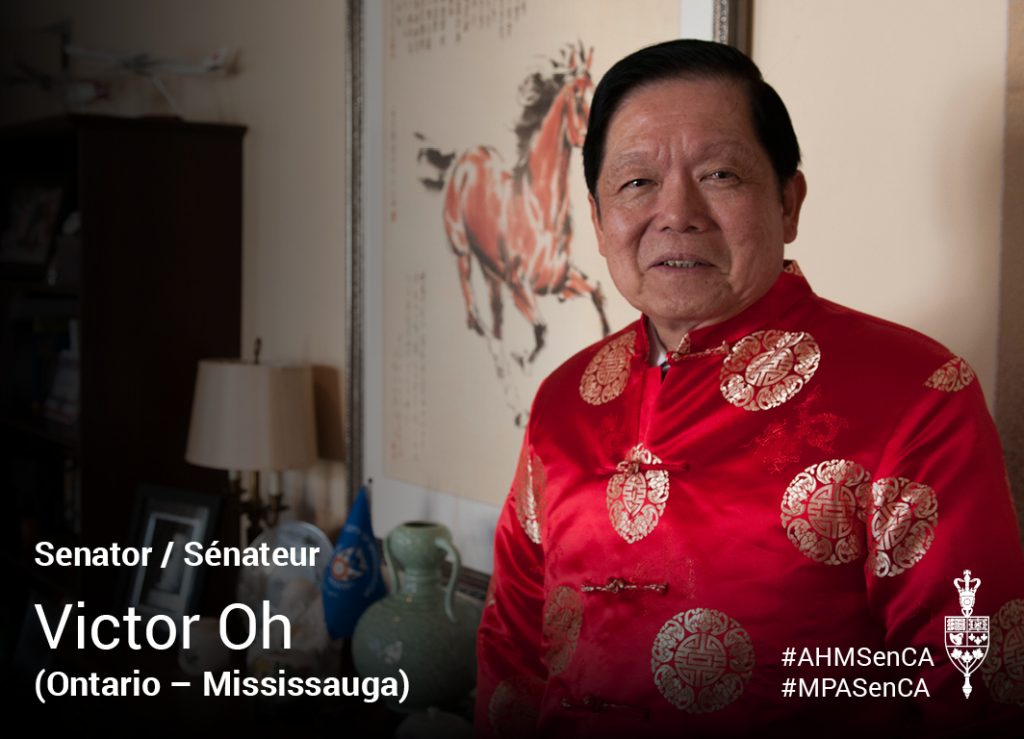 How does your Asian heritage shape your work/role as a Senator?
How does your Asian heritage shape your work/role as a Senator?
I was born and raised in Singapore but am of Chinese descent. Having moved to Canada and become a Senator, I’m honoured to represent the Chinese and Singaporean communities living in our great country.
My role gives me an opportunity to promote Canada’s rich diversity and to build more cohesive communities. I particularly enjoy learning about other customs and traditions, while having the opportunity to share and celebrate my own.
How do you keep in touch with your Asian heritage?
My family and I celebrate two of the major Chinese holidays: Lunar New Year and the Mid-Autumn Moon Festival.
Lunar New Year marks the beginning of a new Chinese calendar, and it usually falls in either late January or early February. It’s a time to be with loved ones and friends to reflect on the past year and look ahead to the future.
The Mid-Autumn Festival signals the end of the harvest, when the moon is at its fullest. We normally come together to eat delicious food and give each other mooncakes.
What person or community group do you think deserves special recognition during Asian Heritage Month for their contributions to Canada?
Former Senator the Honourable Dr. Vivienne Poy and Dr. Ming-Tat Cheung, Director of the Chinese Cultural Centre of Greater Toronto, have made great contributions to the Asian community by promoting cultural diversity and dialogue.
It’s also important to recognize the hard work of everyday people who make a positive impact on society. There are millions of Asian-Canadians who contribute to the well-being and prosperity of the country as a whole.
Related articles
Tags
Committee news
Senate Celebrates Asian Heritage Month

In honour of Asian Heritage Month 2016, SenCAPlus asked seven Senators how their Asian heritage impacts their work.

How does your Asian heritage shape your work/role as a Senator?
I have always been a tremendously proud member of the Pakistani-Canadian community. When I was appointed in 2010, I knew one of my unwritten mandates as a Senator would be to be a voice in the Senate for my community.
I am the first Pakistani-Canadian Senator, and I take this to heart in many aspects of my work here in Parliament, whether it’s in the statements I give or my work in committees. Being a voice for the community is always present in my thoughts.
How do you keep in touch with your Asian heritage?
My heritage is part of my everyday life. If I had to choose just one aspect, it would be strong ties to family — not only to my own family with my husband and two daughters here in Canada, but also to my father, siblings and their families back home in Pakistan, with whom I am in constant touch. Celebrating Eid with prayers and family and friends is one of the many examples of time spent together that is special to me.
What person or community group do you think deserves special recognition during Asian Heritage Month for their contributions to Canada?
It would be too hard to name just one. There are so many Pakistani-Canadians contributing to all aspects of our society, whether it’s as stay-at-home mothers caring for their children, or as doctors, business leaders, politicians and artists. It is truly hard to pinpoint one — I am proud of every Pakistani-Canadian who is contributing to our wonderful country in a positive way.
Read more about Senator Ataullahjan

How does your Asian heritage shape your work/role as a Senator?
My father, who came to Canada from Canton, China in 1912 as a 14-year-old, faced many challenges, including legislation that was discriminatory. He had to pay a head tax; he couldn’t bring his first family to Canada (he returned to China for a couple of years later on and got married in the 1920s); he was unable to hire white women in his café due to a provincial law; and he was unable to vote until 1945. I’ve spoken a lot about these discriminatory laws in the Senate and in many speeches to the public.
How do you keep in touch with your Asian heritage?
Chinese New Year is an important holiday for my family. I remember with pleasure the feasts we had when I was a kid, and we'd get together to celebrate with the Chinese families from neighboring towns.
In 2009, I was invited by the Guangdong Chinese Overseas Association to visit my ancestral home in China. This is a photo of me in traditional dress, taken at the Summer Palace in Beijing.
What person or community group do you think deserves special recognition during Asian Heritage Month for their contributions to Canada?
Eleanor Shia from the Saskatoon Multilingual Schools and the Heritage Chinese Language School. She is also the representative of Saskatoon Chinese community groups.
Read more about Senator Lillian Eva Dyck
 How does your Asian heritage shape your work/role as a Senator?
How does your Asian heritage shape your work/role as a Senator?
I always believe that multiculturalism is one of the greatest strengths of Canada.
Being a Canadian of Filipino and Asian origin, I have that unique opportunity to represent a broader group of people, not just those in the Province of Ontario, but also members of the Filipino and Asian-Canadian communities all over Canada.
The Senate has come to bolster representation of groups often underrepresented in Parliament, such as Aboriginal peoples, visible minorities and women. We, as visible minorities and Asian senators, have a responsibility and the ability to share and contribute our unique values, skills, and culture to complement and enhance various Senate roles and duties for the country as whole.
How do you keep in touch with your Asian heritage?
I used to be one of the directors of the Canadian Multicultural Council – Asians in Ontario and a co-chair of the Asian Heritage Month celebrations in the Greater Toronto Area. I always endeavour to maintain my roots and friendship with many unique communities to celebrate their culture.
As a Canadian of Filipino descent, I always join the celebration of Philippine Independence Day around June 12. This day is one of the times when I wear the national attire of the Philippines, Barong Tagalog, an item of clothing for men that is made from the delicate leaves of pineapple and adorned with intricate embroidery.
What person or community group do you think deserves special recognition during Asian Heritage Month for their contributions to Canada?
There are a lot of organizations that I believe deserve special recognition during Asian Heritage Month. There are organizations that cater to new immigrants and to members of the community who require support, and there are those that endeavour to celebrate their particular cultures. All of them contribute to the betterment of Canadian society, making it extremely difficult to pick only one.
Read more about Senator Tobias C. Enverga Jr
 How does your Asian heritage shape your work/role as a Senator?
How does your Asian heritage shape your work/role as a Senator?
Being Indian is an important part of my identity and is reflected in everything I do, both professionally and personally. As a Senator for the province of British Columbia, I am proud to work on issues that are closely linked to my Asian heritage through such means as being a member of the Canada-Pakistan Parliamentary Friendship Group, leading an inquiry in the Senate on the Komagata Maru and participating in cultural events like Asian Heritage Month.
How do you keep in touch with your Asian heritage?
Being Indian and African is such a big part of who I am as person, from what I eat, the language I speak with my family, the music I listen to and the clothes I wear. However, one thing that I particularly enjoy is dressing up in a sari. My mother always told me that a sari was beautiful because it was nine yards of fabric that would fit any woman in the world. That is something that has always stuck with me.
What person or community group do you think deserves special recognition during Asian Heritage Month for their contributions to Canada?
Former Senator the Honourable Dr. Vivienne Poy.
Read more about Senator Mobina S. Jaffer
 How does your Asian heritage shape your work/role as a Senator?
How does your Asian heritage shape your work/role as a Senator?
The lens through which I view the world and the work I do as a Senator is directly shaped by my Korean heritage. It is who I am.
This means that I am aware of the history of my ancestors, who were kings, freedom fighters, scholars and more. It is a heritage that is steeped in thousands of years of history that includes examples of incredible resilience, valour, pain and sacrifice, including that of my immigrant parents.
This rich and complex heritage is a source of inspiration and strength for me, and it motivates me to serve Canadians to the best of my ability.
How do you keep in touch with your Asian heritage?
My parents promised my paternal grandfather in Korea that they would raise me and my siblings with as much of the Korean culture and traditions as possible.
Only Korean language was spoken in our home (but interestingly we all went on to major in English in our post-secondary degrees). We used chopsticks and ate Korean food at home and observed all the major cultural traditions and holidays.
It was like living in two worlds within and outside of our home, but growing up in East Vancouver — where diversity was always the norm — I never felt out of place among my ethnic Italian, Portuguese, Hungarian, Chinese or German friends who also had immigrant parents.
What people or community groups deserve special recognition during Asian Heritage Month for their contributions to Canada?
I think the pioneers like Douglas Jung (the first Canadian MP of Asian descent) and the Honourable Dr. Vivienne Poy (the first Canadian Senator of Asian descent) as well as the Very Reverend Sang-Chul Lee (a former moderator of the United Church of Canada and a Korean-Canadian pioneer) deserve special recognition for paving the way for us.
Read more about Senator Yonah Martin
 How does your Asian heritage shape your work/role as a Senator?
How does your Asian heritage shape your work/role as a Senator?
As the very first Vietnamese-Canadian Senator, I believe that my heritage is important in shaping my work. It is an example of how the Vietnamese who left their country fleeing oppression have been able to find a home here in Canada, adding to the diverse culture in which we share democratic values and become great contributors to Canadian society.
How do you keep in touch with your Asian heritage?
Through my work, I am able to be involved with the Vietnamese-Canadian communities across the country, and we frequently celebrate and commemorate many cultural traditions. Lunar New Year, also known as Tet in Vietnamese, is the largest celebration of the year, where the community gets together to share food and perform dances and songs.
The Vietnamese diaspora in North America identifies itself with the flag of South Vietnam, also known as the Vietnamese heritage flag, or freedom flag. It was the official flag before the fall of Saigon in April 1975, as opposed to the current Vietnamese government flag.
Last year, I introduced a bill in the Senate that was passed on April 23, 2015: the Journey to Freedom Day Act, which establishes April 30 as a day to remember April 30, 1975, as the Fall of Saigon and the beginning of the Boat People exodus. This is also an important date as it marked the beginning of the modern Vietnamese-Canadian community.
What person or community group do you think deserves special recognition during Asian Heritage Month for their contributions to Canada?
I believe the Vietnamese Association in Toronto deserves recognition. Aside from representing the largest Vietnamese-Canadian community in Canada, they have made many contributions to help the community.
Read more about Senator Thanh Hai Ngo
 How does your Asian heritage shape your work/role as a Senator?
How does your Asian heritage shape your work/role as a Senator?
I was born and raised in Singapore but am of Chinese descent. Having moved to Canada and become a Senator, I’m honoured to represent the Chinese and Singaporean communities living in our great country.
My role gives me an opportunity to promote Canada’s rich diversity and to build more cohesive communities. I particularly enjoy learning about other customs and traditions, while having the opportunity to share and celebrate my own.
How do you keep in touch with your Asian heritage?
My family and I celebrate two of the major Chinese holidays: Lunar New Year and the Mid-Autumn Moon Festival.
Lunar New Year marks the beginning of a new Chinese calendar, and it usually falls in either late January or early February. It’s a time to be with loved ones and friends to reflect on the past year and look ahead to the future.
The Mid-Autumn Festival signals the end of the harvest, when the moon is at its fullest. We normally come together to eat delicious food and give each other mooncakes.
What person or community group do you think deserves special recognition during Asian Heritage Month for their contributions to Canada?
Former Senator the Honourable Dr. Vivienne Poy and Dr. Ming-Tat Cheung, Director of the Chinese Cultural Centre of Greater Toronto, have made great contributions to the Asian community by promoting cultural diversity and dialogue.
It’s also important to recognize the hard work of everyday people who make a positive impact on society. There are millions of Asian-Canadians who contribute to the well-being and prosperity of the country as a whole.


